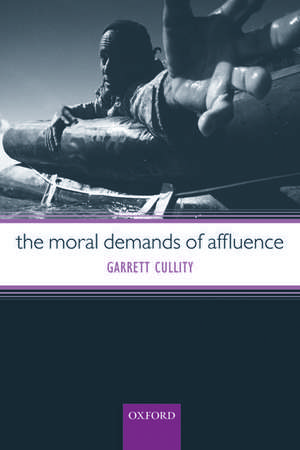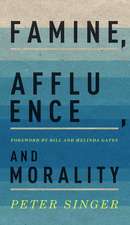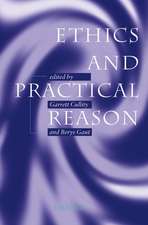The Moral Demands of Affluence
Autor Garrett Cullityen Limba Engleză Paperback – 21 sep 2006
| Toate formatele și edițiile | Preț | Express |
|---|---|---|
| Paperback (1) | 334.08 lei 31-37 zile | |
| OUP OXFORD – 21 sep 2006 | 334.08 lei 31-37 zile | |
| Hardback (1) | 687.27 lei 31-37 zile | |
| OUP OXFORD – 9 sep 2004 | 687.27 lei 31-37 zile |
Preț: 334.08 lei
Preț vechi: 434.07 lei
-23% Nou
Puncte Express: 501
Preț estimativ în valută:
63.93€ • 66.91$ • 53.21£
63.93€ • 66.91$ • 53.21£
Carte tipărită la comandă
Livrare economică 19-25 martie
Preluare comenzi: 021 569.72.76
Specificații
ISBN-13: 9780199204151
ISBN-10: 0199204152
Pagini: 300
Dimensiuni: 155 x 234 x 18 mm
Greutate: 0.47 kg
Editura: OUP OXFORD
Colecția OUP Oxford
Locul publicării:Oxford, United Kingdom
ISBN-10: 0199204152
Pagini: 300
Dimensiuni: 155 x 234 x 18 mm
Greutate: 0.47 kg
Editura: OUP OXFORD
Colecția OUP Oxford
Locul publicării:Oxford, United Kingdom
Recenzii
Review from previous edition How much money and time does morality oblige the relatively affluent to devote to the relief of poverty, suffering, and other disadvantages? Anyone who finds this question remotely important should read Garrett Cullity's meticulous, even-handed treatment. The publication of this monograph signals the continuing emergence of a normative orientation that one might call "beneficence theory". . . . Many philosophers are attracted to the arguments which Cullity . . . dismantles. They will learn from him. By treating well-chosen opposing views so carefully and thoroughly, the book also rewards those who reject the author's ultimate conclusions. . . . the book offers something for nearly everyone. . . . the chapters are well-organized and clearly written. An advanced undergraduate with an ethics background should be able to follow them, and will gain a sophisticated overview of this vital area.
Cullity has presented us with a thorough, detailed, and serious argument ... an important contribution to the discussion of this issue.
Cullity has presented us with a thorough, detailed, and serious argument ... an important contribution to the discussion of this issue.













